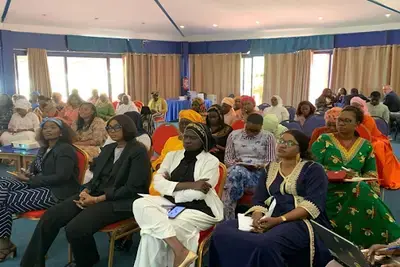
Success Story
NDI Staff Member Seeks to Bring Women into Elections, Politics in Liberia
Mardia Greaves-Bloh was only 17 when Liberia tumbled into a brutal civil war in 1989. The war would continue with brief interruptions until 2003, and she saw children as young as 7 join the fighting. Those who survived often found no homes or families to return to when the conflict ended. It was her compassion for those abandoned children that led her to work for child protection services after the war. For several years, she helped ex-combatant children living in the street readjust to life in Liberian society.
In 2005, Bloh went to work for NDI as an intern. Just as her empathy for those children led to her first career in child services, it was her strong identification with the aspirations of Liberian women that inspired her to work with NDI to help them participate more fully in politics.
“Since 2005, we’ve seen women being more progressive, speaking out more than in the past,” Bloh said. “Liberian women find taking the lead a bit challenging, but they are trying. They are fighting to be heard.”
NDI's 2011 Liberian Elections Program

Liberia is preparing for the country’s second national elections since the end of the civil war in 2003. The presidential and legislative elections, scheduled for Oct. 11, will provide a critical opportunity for citizens to evaluate the performance of elected leaders and consider their alternatives. On Aug. 23, Liberians will hold a referendum on four constitutional amendments passed by the legislature last year. They are: postponing the presidential and legislative elections to the second Tuesday in November; eliminating the current system of second round elections for legislative seats; providing a lifetime appointment for Supreme Court; and shortening the residency requirement for presidential and vice presidential candidates from 10 to five years.
In her five years at NDI, Bloh has worked on a wide range of programs, including efforts to make the legislature more effective and an election-monitoring initiative in preparation for Liberia’s elections later this year. Throughout, she has fought to increase women’s presence in politics. As part of NDI’s program to strengthen the legislature, Bloh supported the Women’s Legislative Caucus of Liberia as it developed and carried out a strategic work plan. Bloh helped the caucus collaborate with women’s groups to advocate for adoption of the Gender Equity in Politics Act of 2010, which seeks to ensure at least 30 percent representation for women in nationally-elected offices and political parties.
In recognition of her commitment to strengthening democracy and increasing women’s participation, NDI awarded Bloh the 2011 Andi Parhamovich Fellowship, which each year honors a woman from an NDI field office or partner organization who is dedicated to building and consolidating democracy in her own country. The fellowship is named in memory of Andi Parhamovich, an NDI staff member who was killed in Iraq in 2007. The Andi Foundation is a nonprofit organization founded by Ms. Parhamovich’s family and friends that helps in the selection process and provides a housing stipend to the fellow.
The awardee travels to the United States for three months to conduct a research project of her choosing. The time is spent in the NDI Washington office, where she meets frequently with Institute staff and other international development experts.
For her project, Bloh is researching coalition building strategies, gender mainstreaming in the electoral process, and the use of information and communications technology in election observation. In preparation for a constitutional referendum in August and general elections in October, she is developing a training module that she will lead with the Elections Coordinating Committee (ECC), a coalition of civil society organizations that is partnering with NDI-Liberia to monitor this year’s electoral process. Her training will focus on helping the ECC identify barriers women face as voters, and ways that the committee can be more sensitive to gender in their observation work. One of Bloh’s goals is to encourage the ECC to incorporate more women into the decision making structure of the coalition, because there is currently only one woman on the leadership committee.
Despite the election of President Ellen Johnson Sirleaf in 2005 and the proposed legislation to bring more women into politics, women in Liberia seeking to enter political life still face numerous barriers, such as discrimination from political parties dominated by men, and traditional and religious customs that keep them at home. When it comes to voting, women in male-dominated households sometimes lack the power to vote for the candidate of their choice because their husbands expect them to vote for the same candidate they select.
Bloh said that what she learns in Washington will help her conduct women’s focus groups to identify ways to eliminate some of these critical barriers.
Related:
Pictured Above: NDI's 2011 Andi Parhamovich fellow, Mardia Bloh, speaks about her work in Liberia.
Published April 4, 2011



